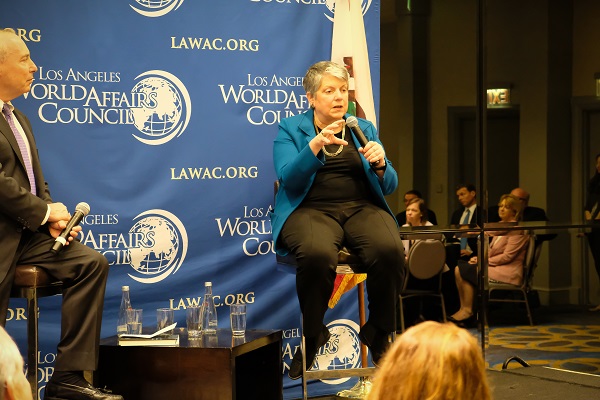 The Honorable Ms. Janet Napolitano, with moderator Dan Schnur (L).
The Honorable Ms. Janet Napolitano, with moderator Dan Schnur (L).
Janet Napolitano, current President of the University of California, shared her experiences at the Department of Homeland Security and addressed contemporary security concerns at a LAWAC dinner on April 9th. Although DHS was created in response to the 9/11 attacks, Napolitano identified three risks that have grown since its inception. Cybersecurity and cyberattacks on our critical infrastructure are of primary concern. The risk of mass gun violence follows. Finally, Napolitano added that the risks associated with global warming and climate change, such as extreme weather events like those seen in California this past year, pose greater threats.
In conversation with Dan Schnur, former political strategist and professor at USC Annenberg School of Communication, she explained why we haven’t had another 9/11. Napolitano firmly stated that the immediate action in the aftermath of the attacks was key. DHS effectively shut down the ability of passengers to bring weapons and explosives onto a plane. She added that “an attack like 9/11, where foreign nationals can come to the US, attend flight school, weaponize aircrafts, and fly them into iconic buildings – that risk has been eliminated, that can’t happen anymore.” Napolitano reassured the audience that “we are safer when we are in a position to share actionable intel on a real time basis across countries.” While she was Secretary, the department gained information passed from Saudi Arabia to the British about explosives in printer toners in aircrafts and that allowed DHS to put better inspections in place.
During her time as Secretary, the department gave members of the US Senate a briefing on how the electrical grid of a major US city could be taken down without much effort or technical capacity. Despite the alarming demonstration, no security bill was passed. Napolitano noted that “as Secretary, 10% of my time was spent on cyber related matters and in 2013 at the end of my term, 40% of my time was spent on cyber and that has only grown,” and agreed that more work needs to be done. She admonished the audience: “We didn’t see it in our future that a foreign adversary would attack our election system. What are we doing to prevent that in 2020?” According to Napolitano, the US government needs to exchange actionable intelligence and work with the private sector to prevent a cyberattack on critical infrastructure.
When asked about the challenge of the US-Mexico Border, Napolitano clarified that it is a zone - not just a border- responsible for millions of dollars in trade. She urged for improved technologies such as tunnel detection sensors and drones to act as force multipliers for the manpower already in place. Safety and security at the Southwest border require a strategy and “building a wall is a symbol not a strategy. Show me a 10 foot wall and I’ll show you an 11 foot ladder.”
When asked about what keeps her awake at night, Napolitano revealed that she has always been a good sleeper and had to be as the Secretary of Homeland Security. However, she stressed that global warming should be a much bigger concern. “It’s happening on our watch,” and as the planet warms migration patterns change and pandemics emerge.
When asked about her opinion of the feasibility of the Green New Deal, Napolitano acknowledged she did not know enough but appreciated how it has elevated climate change into public discourse. In terms of nuclear power, Napolitano conceded that it can be an attractive source but it must be immune from an attack.
Prompted by Dan Schnur’s question on civil liberties and safety, Napolitano addressed the false dichotomy between privacy and security. DHS is the only federal agency with its own Office for Civil Rights and incorporates privacy by design into security protocols. She recounted that when she was Secretary, “the Drudge Report nicknamed [her] ‘Big Sis’ to suggest [she] was running an Orwellian agency looking into people’s privacy.” Napolitano admitted that one of her regrets as Secretary was not having a better relationship with the media to show what the department was really doing.
Janet Napolitano concluded by reminding the audience that security is the essence of a nonpartisan issue.
